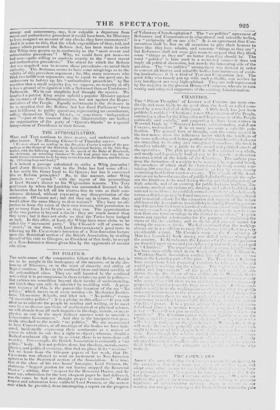NO Pour T. main cause of the comparative failure of
the Reform Act, is not to be sought in the inadequacy of the measure, or in the dis- honesty of' :Ministers, or in the want of sincerity and ability of Represontatives. It lies in the contbsed ideas and timid servility of the enfranchised class. They arc still haunted by the c,onfused notion that it is presumptuous in them to take any part in politics-- that rolities are something beyond their faculty of understanding. and which they can only do mischief by meddling with. A preg-
nant instance of this, is the parrot-like it of the cry'' No polities." which meets us at every turning—in Mccliailies Institu- tions, Elementary Schools, and what not. '• No polities" tnenns "Conservative politics" : it is a pledge to this effect —" It' you will allow 115 to educate the people in reading. and writing. or to meet ours 'Ives to discuss questions of mathematical or physical science, we \% ill abstain from all such inquiries in theology, morals, or meta- Physics, as can in the most intlireet ton au tonal to unsettle a Conservative Government." And this is the interpretation prac- tically attached to the words " no polities." We are accustomed to hear COnSerVAiVe.4, :It tall IlleethigS or the 1.110dieS we hare indi- cated, incidentally expressing their sentiments :1A a matter of course to which no one has at tight to object ; whereas, should a Radical sentiment slip out by accident, there is an immediate tall to order. For example. the British Association is eminently a no Polit ics" body. It is not polities alone, but theology, morals, meta- physit s, and political economy, that lind no place in its" sections." it we learn from the Glasgow papocs tat. last week, that Dr. Cei taanmes was allowed to rend an incitement to N on- intrusion agitation in the Statistical section of the Association. It is trui. that at the close of his two hours' harangue!, Loral SANoos, the chairman, " bogged pardon for not having stopped the Reverend Doctor"; 'adding, that " respect for the Reverend Doctor, and has must say, admiration for the Very elOtillellt paper he had delivered, was the cause he had not thought proper to interi'cre." Would respe,t and iidudr.tion WithhChl Lord St NOON, OE the seetton ovcr which he presided, front interrupting a report on the progress of Voluntary-Church-agitation? The "no politics" agreement of Reformers and Conservatives in educational and scientific bodies, is a " reciprocity all on one side." It is an agreement that Con- servatives shall be free on all occasions to give their hearers to know that they love, admire, and venerate "things as they are"; but Refinmers shall not even give room to suspect that they think some " things as they are" no better than they should be. The word " politics" is here used in a restrieted sense—it does not imply all political discussion, but merely the innovating side of the question. The " no polities" arrangement was devised in order to convert all literary and scientific bodies into buttresses of exist- ing institutions: it is a kind of Test and Cerperation Act. The good folks who tamely put up with such a shuffle, cam neither be very intelligent raw very high-spirited. They are well represented by the majority in the present House of Commons, ttho are in turn worthy and congcninl supporters of the existing Administration.


























 Previous page
Previous page